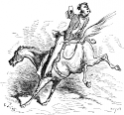Pike Out
Hit the road, Jack.
Dear Word Detective: I would like to know the origin of the phrase “to pike out,” meaning “to give up when the going gets tough,” used in Australia and New Zealand. — Priscilla Lawrence.
“To pike out” must be fairly rarely, if at all, used in the US, because I’ve never heard the phrase. It sounds like a rough equivalent of our “throw in the towel,” originally a  term in boxing, where a manager would throw a towel into the ring to signal that his fighter was giving up. We do call a poor sport or a shirker a “piker,” and the terms are, it seems, probably related.
term in boxing, where a manager would throw a towel into the ring to signal that his fighter was giving up. We do call a poor sport or a shirker a “piker,” and the terms are, it seems, probably related.
The basic sense of “pike” as a noun is “pointed stick,” and the word is a close cousin of “pick,” which, as a verb, developed over the centuries from meaning “poking with something sharp” to “separating things” (as in “picking fruit”) to “carefully selecting” (as in “picking a candidate”).
“Pike” followed a similar path of development, though not as elaborate. One of the earliest senses of “pike” as a noun was “a pilgrim’s staff,” what we would call today a walking stick. The earliest meaning of “pike” as a verb, back in the 15th century, was “to depart, to leave quickly” often used as an imperative (“Pike it, buddy!”) embodying the sense of “pick up your walking staff and beat it.” This “to pike” was also used to mean “to run away like a coward” which later developed into “to gamble cautiously, to shirk,” and, more generally, “to hold back, to back out,” bringing us to the sense of “to give up when the going gets rough” you mention, which is currently used, according to the Oxford English Dictionary, in Australia and New Zealand.
Our use of “piker” in the US to mean “a vagrant, vagabond, shirker or poor sport” may well derive from this sense of “pike” meaning “to leave or run away.” But it’s also possible that our “piker” comes from the sense of such a person wandering down the “turnpike,” originally a toll road where the barrier at toll stations was a “pike,” a long pole across the road.
Remember: Nothing says “Congratulations on surviving another attack by your pet wolverine” like a Gift Subscription to TWD-By-Email.

Michael:
March 13th, 2012 at 8:59 pm
could it possibly be a reference to a defending pikeman soldier who pulls his pike’s butt free from the dirt (hence pike out) and retreats during a sustained assault?
Monika:
July 3rd, 2015 at 10:35 pm
I would’ve thought it would come have probably come from diving, where, if you can’t finish a dive in layout position, you’d pike (so you can finish rotating faster).